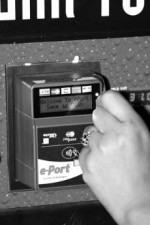University goes cashless

More areas on campus will no longer accept cash as a result of the University’s effort to centralize money collection within its departments.
Ray Androne, associate in the University Controller’s Office, said the University’s move toward going cashless was designed to reduce a variety of risks for the school. The controller’s office is in charge of the school’s financial transactions.
“Electronic transactions utilizing debit and credit cards offer a level of security and accountability that is many times safer than cash,” Androne said.
The University decided to eliminate the ability to pay cash only in departments where it would not interfere with the goals of that particular business.
“The University has identified those departments with a specific need for accepting cash as well as those for which collecting cash is not mission critical,” Androne said.
Ryan Baker, a junior majoring in biomedical science, experienced what a cashless campus can be like.
“I already had a problem with the ID center. They don’t take cash and I lost my wallet, so I didn’t have anything and I was trying to get a new ID,” Baker said. “So, I had to go to this office and that office – I just think it’s a bad idea if you don’t take cash.”
Nick Trivunovich, university controller, said some places continue to accept cash, such as the parking lots in which coins are still used, but every department is different.
“We have tailored the cash acceptance program to the needs of each department’s constituencies,” Trivunovich said.
Student Health Services and Residence Services only accept bank cards for payments. However, Trivunovich said students can still pay for housing in cash through a special residence hall change fund. Trivunovich said the University is also in the process of installing cashless meters in the parking lots.
Michelle Cook, a junior majoring in English literature, said she worries that going cashless may not be practical for students.
“College students usually aren’t going to have huge… checking accounts,” Cook said. “If I am using my regular card for something it’s usually for a big purchase, not to just spend a couple dollars here or a couple dollars there. I would usually have already withdrawn cash for that, so this just doesn’t make any sense.”
Fairfax Vickers, student affairs business director, said going cashless is a way for the University to centralize cash collection so that there is less risk within each department.
“We can monitor segregation of duties and make sure all checks and balances are in place,” she said.
Vickers said she believes going cashless is safer not only for the University, but also for students.
“I think that if people don’t have cash it reduces their risk of theft,” she said.
However, Joanne Brown, a junior majoring in international relations, said that because she lives on campus she rarely carries her debit card and instead carries cash.
“There have been a few times when I only had my ID and cash on me because that’s all I’ve really needed,” Brown said. “So I wouldn’t be too crazy about this.”





